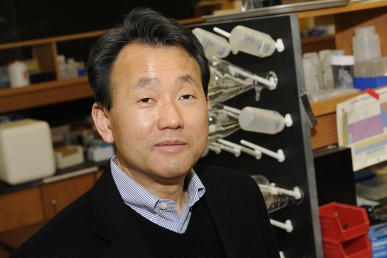Cholesterol plays key role in cell function, researchers find

Chemistry professor Wonhwa Cho and his team of international colleagues report that cholesterol helps regulate important signaling proteins in the cellular process. UIC Photo Services
Cholesterol’s role in heart disease has given it a bad reputation — but in fact, it may be important to cell function.
An international team led by a UIC researcher found that cholesterol plays a key role in regulating proteins involved in cell signaling.
Inside the thin membrane of a cell, the tight regulation of cholesterol at high levels (30 to 40 percent) suggests it plays a major role in cellular processes, said Wonhwa Cho, professor of chemistry and principal investigator for the study.
Cho and colleagues had previously found evidence that cholesterol was directly interacting with many proteins found in the interior of the cell. The interaction seemed necessary for the proper functioning of these proteins.
“This was quite a surprising finding,” said Cho, because cholesterol resides within the membrane, sandwiched between its inner and outer face. Cell biologists had thought it could only interact with other biomolecules within the membrane.
In the new study, Cho and his colleagues showed how cholesterol interacts with a scaffolding protein, one of a class of proteins that plays an important role in cell signaling. The researchers found that cholesterol binds to a region on the protein molecule where one of its signaling partners also binds — and that disrupting cholesterol binding to the protein makes it unable to activate its partner.
The researchers describe in detail how the protein hooks onto and reaches inside the membrane to find and bind cholesterol.
Cho believes this strategy for interacting with cholesterol may be used by many interior cellular proteins and offers an insight into what is known about the importance of cholesterol to well-functioning cells.
Much of the existing data on the cholesterol-related regulation of cellular processes had been difficult to interpret, he said.
“This is a major finding that will help people understand how cholesterol may regulate other cellular processes,” Cho said.
The results of the study were reported in the journal Nature Communications.
Ren Sheng, graduate student in chemistry, was first author of the paper. Other authors are Yong Chen, Ewa Stec, Heather Melowic, Nichole Blatner and Moe Tun, department of chemistry; Morten Kallberg and Hui Lu, bioengineering; Heon Yung Gee, Yonjung Kim and Min Goo Lee, Yonse University College of Medicine, Seoul; Takahiro Fujiwara and Akhiro Kusumi, Kyoto University, Japan; and Ji Hye Hong and Kwang Pyo Kim, Konkuk University, Seoul.
jgala@uic.edu
